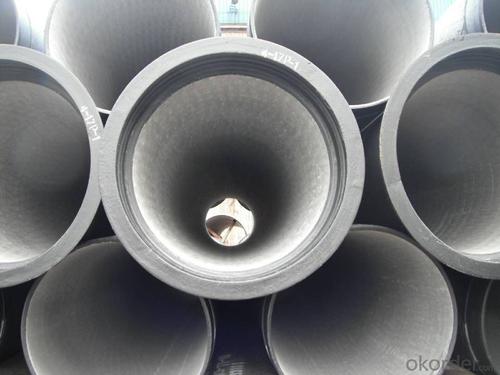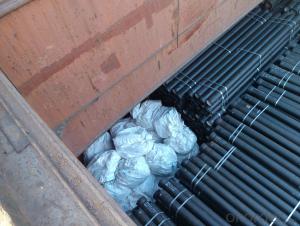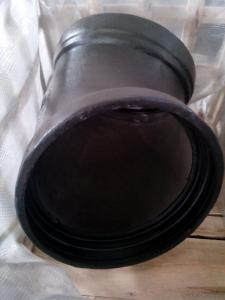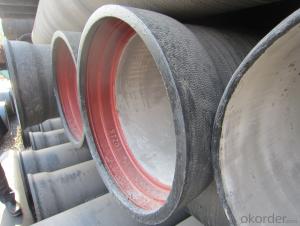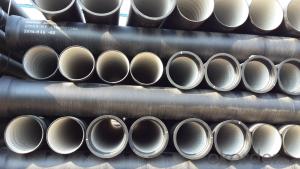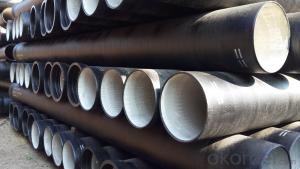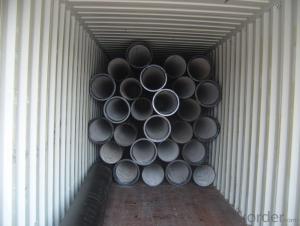DUCTILE IRON PIPE DN100
- Loading Port:
- China Main Port
- Payment Terms:
- TT OR LC
- Min Order Qty:
- -
- Supply Capability:
- -
OKorder Service Pledge
OKorder Financial Service
You Might Also Like
Specification:
1) The standard of pipe: ISO2531:1998, K9
2) Effective length: 6m
3) Inner cement line: Portland cement line as per ISO4179
4) Zinc coating: at least 130g/m2 as per ISO8179
5) Bitumen painting: at least 70um as per ISO8179
6) With 100% quantity of NBR ring, or SBR ring, or EPDM ring as per ISO4633
7) DN80mm-800mm
8) High strength, lighter than grey iron, good corrosion resistance, no furring, small flow resistance, easy fixing, long life tome about 100 yeas
9) Produced by Hangzhou chunfeng machine
10) Checked by automatic inspection equipment
11) Composition:
Chemical composition | |||
Chemical composition | Ductile Cast Iron Pipe (%) | Grey iron pipe (%) | Steel pipe (%) |
C | 3.5-4.0 | 3.2-3.8 | 0.1-0.2 |
Si | 1.9-2.6 | 1.4-2.2 | 0.15-0.4 |
Mn | 0.15-0.45 | 0.4-0.6 | 0.3-0.6 |
P | ≤0.06 | ≤0.3 | 0.02-0.03 |
S | ≤0.02 | ≤0.1 | 0.02-0.03 |
Mg | 0.03-0.06 |
|
|
12) Feature:
Mechanical properties | |||
| Ductile Cast Iron Pipe | Grey Iron Pipe | Steel Pipe |
Tensile Strength(Mpa) | ≥420 | 150-260 | ≥400 |
Yield Strength(Mpa) | ≥300 | No Confirmation | No Confirmation |
Bending Strength(Mpa) | ≥590 | 200-360 | ≥400 |
Elongation (%) | ≥10 | Neglected | ≥18 |
Brinell Hardness(HBS) | ≤230 | ≤230 | About 140 |
13) T type mechanical joint
14) Packing: in bulk or container
- Q: How do ductile iron pipes handle pressure surges in pumping stations?
- Ductile iron pipes are specifically designed to handle pressure surges in pumping stations effectively. The inherent strength and flexibility of ductile iron make it well-suited to withstand the sudden increase in pressure that can occur during pump start-up or shutdown. One of the key features of ductile iron pipes is their ability to absorb and dissipate energy. When a pressure surge occurs, the ductile iron pipes have the capacity to absorb the excess pressure and distribute it evenly throughout the pipe network. This helps to minimize the impact of the surge and prevent any potential damage to the pipes or the pumping station. Additionally, ductile iron pipes have a high resistance to impact and stress, which further enhances their ability to handle pressure surges. The pipes are manufactured using a unique process that imparts strength and durability, allowing them to withstand the forces exerted during pressure fluctuations without any significant deformation or failure. Furthermore, ductile iron pipes have a smooth internal surface, which reduces friction and turbulence within the pipe network. This smooth flow characteristic helps to mitigate the effects of pressure surges by allowing the water to move efficiently without creating additional stress on the pipes. In summary, ductile iron pipes are specifically engineered to handle pressure surges in pumping stations by absorbing and dissipating the excess pressure, withstanding the impact and stress, and promoting smooth flow. Their robustness and reliability make them an ideal choice for applications where pressure fluctuations are common, ensuring the longevity and efficiency of the pumping infrastructure.
- Q: Can ductile iron pipe be used for hot water applications?
- Yes, ductile iron pipe can be used for hot water applications. Ductile iron pipe is known for its strength, durability, and high resistance to corrosion, which makes it suitable for a wide range of applications, including hot water systems. It can handle high temperatures and pressure, making it a reliable choice for transporting hot water. Additionally, ductile iron pipe's thermal conductivity properties allow for efficient heat transfer, ensuring that hot water is delivered effectively throughout the system. Therefore, when considering materials for hot water applications, ductile iron pipe is a suitable option.
- Q: How are ductile iron pipes manufactured?
- Ductile iron pipes are manufactured through a process called centrifugal casting. In this process, molten iron is poured into a spinning mold, which creates a centrifugal force. This force helps to distribute the molten iron evenly along the mold's inner surface, resulting in a dense and uniform pipe wall thickness. After cooling and solidification, the pipe is removed from the mold, tested for quality, and then coated with a protective layer to enhance its durability and resistance to corrosion.
- Q: What is the expected bedding and backfill requirements for ductile iron pipes?
- The expected bedding and backfill requirements for ductile iron pipes typically involve using a suitable bedding material, such as crushed stone, to provide support and stability to the pipe. This is followed by proper backfilling around the pipe with a granular material, such as sand or gravel, to protect the pipe from external loads and prevent damage. The specific requirements may vary based on factors such as soil conditions, pipe diameter, and depth of installation. It is important to consult relevant standards and guidelines to ensure proper installation and long-term performance of the ductile iron pipes.
- Q: Can ductile iron pipes be used for submarine pipelines?
- Submarine pipelines can indeed utilize ductile iron pipes. Ductile iron, celebrated for its robustness and durability, proves suitable for a range of applications, including those submerged underwater. For decades, ductile iron pipes have been successfully employed in the construction of submarine pipelines. They possess the ability to endure the harsh conditions prevalent in underwater environments, such as corrosion, pressure, and shifting seabeds. Furthermore, ductile iron pipes display exceptional resistance to external loads, rendering them ideal for submarine pipelines that bear the weight of water and potential impacts. However, it remains imperative to consider factors such as coating, cathodic protection, and proper installation techniques to ensure the long-term performance and integrity of the submarine pipeline.
- Q: What is the content of silicon in silicon molybdenum ductile iron?
- Silicon molybdenum material, similar to the United States IDM5381, 5402 and other brands, engaged in automotive components (such as turbocharger parts), and other heat resistant parts have been exposed to high temperature
- Q: Can ductile iron pipes be used for river crossings?
- Yes, ductile iron pipes can be used for river crossings. Ductile iron is a strong and durable material that is capable of withstanding the pressure and stress of being buried and crossed by a river. It is commonly used for various applications, including water and sewage systems, and has been proven to be reliable for river crossings. However, it is important to consider other factors such as the depth of the river, the size and weight of the pipes, and the installation process to ensure the proper design and installation of the ductile iron pipes for river crossings.
- Q: Can ductile iron pipes be used for dam construction?
- Yes, ductile iron pipes can be used for dam construction. Ductile iron pipes are known for their strength, durability, and corrosion resistance, making them suitable for a wide range of applications, including dam construction. These pipes can withstand high pressure, making them ideal for transferring water or other fluids within the dam structure. Additionally, their ability to withstand external loads and ground movement makes them a reliable choice for the construction of dams. Ductile iron pipes are also relatively easy to install and maintain, further adding to their suitability for dam construction projects.
- Q: Can ductile iron pipes be used for pressure surge applications?
- Ductile iron pipes are suitable for pressure surge applications. Their excellent strength and durability enable them to handle surge pressures caused by sudden flow rate changes or water hammer events. These pipes can withstand high internal pressures and are highly resistant to impact and fatigue. Moreover, their smooth interior surface facilitates efficient fluid flow, minimizing the risk of pressure surges. However, it is essential to consider factors such as pipe size, wall thickness, and proper installation techniques to ensure safe handling of specific pressure surge conditions. Consulting a professional engineer or pipe manufacturer is advised to assess the suitability of ductile iron pipes for pressure surge applications.
- Q: How are ductile iron pipes protected against stray current corrosion?
- Ductile iron pipes are protected against stray current corrosion through the implementation of various measures. One common method is the installation of a protective coating, such as an epoxy or zinc coating, on the external surface of the pipes. This coating acts as a barrier, preventing direct contact between the pipe and the surrounding soil or water. Additionally, cathodic protection systems, such as impressed current or sacrificial anode systems, can be employed to further protect the pipes. These systems help to control and redirect stray currents, minimizing their impact on the ductile iron pipes and preventing corrosion.
Send your message to us
DUCTILE IRON PIPE DN100
- Loading Port:
- China Main Port
- Payment Terms:
- TT OR LC
- Min Order Qty:
- -
- Supply Capability:
- -
OKorder Service Pledge
OKorder Financial Service
Similar products
Hot products
Hot Searches
Related keywords




